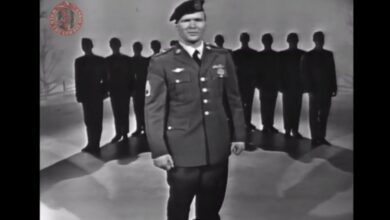Experience the pain in Dwight Yoakam’s “I Sang Dixie,” a heart-wrenching country classic.
Dwight Yoakam, a prominent figure in country music, established his unique presence in the genre by fusing traditional country sounds with rockabilly influences. Born on October 23, 1966, in Pikeville, Kentucky, and raised in Columbus, Ohio, Yoakam’s early years were filled with musical inspiration from artists like Buck Owens, Patti Page, and Merle Haggard, all of whom significantly shaped his songwriting and performance style.
Yoakam’s career took off after he relocated to Los Angeles in the early 1980s, where he discovered an eager audience for his distinctive sound. His debut album, *Guitars, Cadillacs, Etc., Etc.*, released in 1986, highlighted his ability to combine contemporary country flair with traditional elements. The album was well-received, especially the title track, paving the way for his future successes. His distinctive voice, marked by heartfelt emotion and a unique twang, quickly captivated both critics and fans.
The release of *Hillbilly Deluxe* in 1988 was a turning point for Yoakam, featuring the hit “I Sang Dixie.” This song deeply connected with listeners, capturing themes of nostalgia and self-reflection. Its lyrics go beyond mere storytelling, evoking universal memories that resonate with anyone who has strayed far from home. Yoakam’s talent for storytelling shines through as he encapsulates the longing for one’s roots—a sentiment that many can relate to.
Musically, “I Sang Dixie” is infused with traditional country instrumentation, notably the steel guitar, which enhances its authenticity. Yoakam masterfully intertwines these classic sounds with modern country styles, reflecting a trend in the genre that honors its legacy while embracing innovation. The song’s arrangement expertly blends rhythmic components that drive the narrative, inviting listeners into his evocative world.
The emotional weight of “I Sang Dixie” is amplified by Yoakam’s exceptional vocal performance. His expressive delivery brings the lyrics to life, inviting listeners to relive their own memories of home and time’s passage. This connection showcases his talents not only as a songwriter but also as an interpreter of his own work. His concerts emphasize this bond, as he interacts with audiences, enhancing the emotional impact of his music.
Throughout the years, Dwight Yoakam has made significant contributions to country music. He has received numerous awards, including Grammy accolades, highlighting his influence and the high caliber of his artistry. In addition to his musical career, Yoakam has explored acting, demonstrating his versatility as an entertainer through roles in films like *Sling Blade* and *Panic Room*.
“I Sang Dixie” continues to be celebrated, resonating with various artists who recognize its importance within the country music landscape. Its themes of nostalgia and identity appeal to a diverse array of musicians and songwriters, solidifying its place in the cultural narrative. Numerous cover versions and tributes honor Yoakam’s original, ensuring its legacy in the soundscape of contemporary country music.
As the genre of country music evolves, Yoakam’s influence is reflected in the works of younger artists who blend traditional and modern sounds. His exploration of diverse musical directions, while remaining true to his roots, serves as a valuable lesson for many. The narratives in his music, particularly in songs like “I Sang Dixie,” invite listeners to delve into their personal and collective histories, underscoring the significance of storytelling in song.
Additionally, the song acts as a cultural bridge, often uniting audiences through the shared emotional experience it evokes. The balance between personal and universal themes is a key aspect of country music’s relatability. Yoakam’s ability to tap into this connection further solidifies his status as a pivotal figure in the genre’s ongoing narrative, which continues to unfold through his music.
In conclusion, “I Sang Dixie” is more than just a poignant expression of longing for home; it embodies Dwight Yoakam’s artistic essence and the larger themes prevalent in country music. By blending diverse influences and engaging storytelling, Yoakam has significantly enriched the genre, paving the way for future artists while maintaining deep connections with both new and longtime fans. The song’s lasting appeal is a testament to his remarkable ability to evoke powerful emotions through music, creating a legacy that will resonate for years to come.





